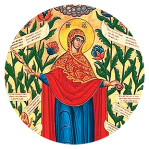We know him by his baptismal name, Patrick, but he was named Ronald, the youngest (by 3 minutes) of identical twin boys. His brother was Donald. They were preceded by a sister and followed by two more sisters. Living in Sydney, Ohio, Patrick’s father was a gas distributor who delivered gas to farms and companies in the area. At first his mother was an x-ray technician, then became a full time mother. Patrick grew up in this small town, their home being one of the first in their subdivision. The family regularly attended the local Methodist church.
Donny and Ronny were rambunctious boys who were competitive and fought a lot in their early years. Their Dad served as referee on many occasions, especially on the golf course. Patrick remembers that his father earned a tidy sum through wise investments in the stock market, which he used to renovate the basement of their home. One particularly nice feature was a marble bar that was installed. Shortly after that, while Donny and Ronny were playing Quick Draw McGraw, the boys jumped on the bar, which fell down and got damaged, leading their father to comment. “We can never have nice things with these boys around!”
Their competition continued, but the physical fighting subsided somewhat as the boys moved into Junior High School. They took up golf in eight grade and each won tournaments. They also played football. Being a small town, the same man served as coach for both activities through ninth grade.
Donny went off to Ohio State to major in Accounting. Ronny started at the University of Cincinnati, but after the first quarter joined his brother at Ohio State, earning a B.S. in Finance. Ronny worked at various jobs, including Stolle Manufacturing and Dresser Industries, where he was domestic credit manager.
During his junior year in college, Donny began to manifest symptoms of mental illness, eventually being diagnosed with Schizophrenia, a disorder with symptoms including false beliefs, unclear or confused thinking, hearing voices that others do not, reduced social engagement and emotional expression, and a lack of motivation. At the age of twenty-five, Donny killed himself, leaving his devastated brother behind.
Ronny became involved with a Christian community, but within a few years experienced a mental health episode himself, standing up in the middle of a service and demanding of the leader, “Show us that you are the light.” He says, “Those were not the exact words, but it was something like that.” He continued to disturb the service and was escorted out and later taken to a hospital for help. After two weeks, he was transferred to another hospital where he remained for five and a half months. The diagnosis was Bipolar Disorder (known then as Manic-Depressive Disorder). This disorder is caused by structural and functional changes in the brain or changes in genes. He remembers considering that other people were happy and seemed to have their lives together, but he didn’t feel the same. He pursued yoga and meditation and continued to participate in the Christian Community.
After his release, Ronny enjoyed a good job in accounts receivable, which enabled him to buy a house. Unfortunately, he stopped taking his medication and while out with a cousin started acting up again. This incident is a little blurry to him – he doesn’t remember the details of what took place, but he was taken to a hospital where he spent six months. He returned to his job but was no longer competent at it and was laid off.
The Christian Community that he belonged to had been seeking true Christianity and concluded that the Orthodox Christian Church was where they wanted to be. In 1988, at the age of 36, Ronny was baptized as Patrick, which is how he is known today. During his struggles, Patrick had developed a rule of praying four times a day. On becoming Orthodox, he decided to practice the Jesus Prayer, which has been very comforting and beneficial for him. The prayer is, “Lord Jesus Christ son of God, have mercy on me a sinner.” This prayer helps us to focus our mind exclusively on God with no other thought occupying our mind but the thought of God. It also helps us to pray continuously as Paul directed us to in 1 Thessalonians 5:17.
A year after he was baptized, Patrick’s father passed away. The following year Patrick checked himself into a hospital when he felt like he was losing control and recognized that he was having wrong thoughts, even thoughts of suicide. Like previous admissions, Patrick remained hospitalized for six months, but he was more hopeful upon release. Becoming Orthodox resulted in feeling more of God’s presence in his life. Study and practicing the Jesus Prayer (also known as the Prayer of the Heart) helped him be still and know God. He commented, “When you make a small step, God makes big steps. God is always available – the question is am I going to do what’s necessary?”
More than twenty-seven years have passed since Patrick’s last hospitalization. Yes, he still takes medication regularly, but he has had no more episodes. After he left the hospital it was difficult to get a job, so he threw himself into volunteer work helping others with mental illnesses and serving as a liaison for others who are returning to the outside world after a hospitalization. Eventually Patrick landed employment with the state and maintained his job for 18 years, at which time he was able to retire.
Patrick remains an active volunteer, serving as Assistant Treasurer who collects donations and make deposits. At various points he has served as President, Secretary, and Treasurer of our Board. He also volunteers at our St. Seraphim Bookstore and coordinates all the Saturday volunteers. He says, “If I can be helpful, I will be.” This is evident in his annual service with the Christmas Families and his parking lot supervision during the Talbot Street Art Fair. He is well known for his dependability in these efforts.
An avid reader, Patrick recommends the book St. Dorotheos of Gaza, about a monk and abbot who lived from 505 to 565 near Gaza. St. Dorotheos said, “Do not wish for everything to be done according to your determination, but wish that it is how it should be, and in this way, you will attain peace with everyone. And believe that everything that happens to us, even the most insignificant, occurs through God’s Providence. Then you will be able to endure everything that comes upon you without any agitation.”
Patrick also recommends Saint Paisios of Mount Athos, about a well-known Greek Eastern Orthodox ascetic from Mount Athos.
The bottom line about Patrick is that he considers his prayer time to be precious. “Without prayer, how can I get out and function?” he asks.
If you or someone you know is considering suicide, please call 1-800-273-8255. The Lifeline provides 24/7, free and confidential support for people in distress, prevention and crisis resources for you or your loved ones, and best practices for professionals.
Writer Anna Glass is a member of Joy of All Who Sorrow who serves on the Board and the Capital Campaign Steering Committee. Comments on and submissions to this blog can be sent to annetteglass03@gmail.com.
The books mentioned here can be obtained through St. Seraphim’s Bookstore, located next to the church. They also carry many books on the Jesus Prayer.
A good video about the Jesus Prayer can be found at https://www.youtube.com/watch?v=lSsv9_9bOy4.


